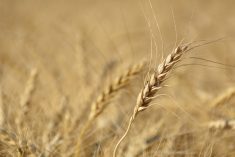Necessity and annoyance are causing Manitoba farmers to consider composting cattle.
Although few cattle producers do it now, some think they might have to try it once the ground freezes, said Keystone Agricultural Producers president Weldon Newton.
“People are having to look at the alternatives,” said Newton.
For many producers, burying dead cattle will become impossible once the ground freezes.
Winnipeg renderer Rothsay will continue its present practice of picking up deadstock at farms, but it now charges a fee to do so because it cannot use the material in its products.
Read Also

Why feds imposed EV tariffs
Moe and Kinew have a fight on their hands when it comes to eliminating the EV tariff. Canada has to worry about pissing off the U.S. and Mexico and hundreds of thousands of auto workers.
Manitoba provincial veterinarian Allan Preston said Winnipeg’s Brady Road landfill will continue to bury cattle and offal through the winter, so farmers can continue to have Rothsay deal with the deadstock problem.
But Newton said “many farmers are reluctant to have to pay to have them picked up.”
Composting is well known and accepted in Manitoba’s hog industry. Newton has composted dead pigs for a number of years and “it works great.”
But a dead cow or steer is a bigger matter, and Preston said some farmers aren’t keen to deal with the mess.
“You should open or dismember the carcass to improve the aerobic affect,” Preston said.
“As soon as you mention that to a producer, you hit a bit of a roadblock. Nobody likes breaking up a carcass into bits and pieces.”
Rothsay is facing its own challenges this winter. The company is still exporting rendered material to the United States, but that’s because it now only renders dead pig matter.
It uses some of its trucks to pick up dead cattle and offal, but those trucks can’t go into the Rothsay plant because of Canadian Food Inspection Agency rules.
It may face problems during the winter when temperatures dip far below the freezing point and Rothsay trucks are left in the cold. Cooling piles of cattle offal may freeze and become impossible to remove from the trucks.
Preston said the provincial government and Rothsay are trying to find a warehouse or facility in which the trucks can warm up if their loads freeze.
Newton said some farmers may consider stockpiling deadstock once winter comes, but that still leaves a problem to deal with next spring, when it thaws.
Newton said producers interested in composting deadstock can contact the Manitoba Pork Council, which has tip sheets about how to do it effectively and safely.















